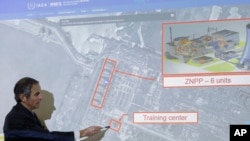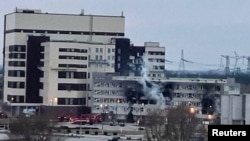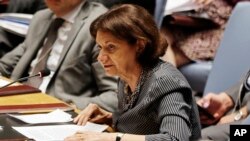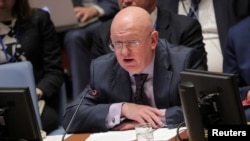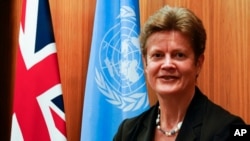The head of the International Atomic Energy Agency said Friday that the reactors at Ukraine's largest nuclear plant had not been affected during a Russian attack on the site in the early hours Friday that shocked the globe and raised fears of a possible nuclear accident.
"We confirm through our contacts at the regulator, but also directly from plant — we were able to confirm that no security or safety systems have been compromised, neither of the reactors themselves have been hit by this projectile," IAEA Director General Rafael Grossi told an emergency meeting of the U.N. Security Council.
Unusually, the nuclear watchdog chief spoke by video connection from an airplane. He said he was on a flight to Iran to deal with outstanding nuclear issues there.
Grossi told council members that Ukraine has four large nuclear sites, 15 reactors and associated facilities, as well as the defunct Chernobyl site, which experienced a catastrophic meltdown in 1986.
He did not name Russia when describing the attack, saying only that "a projectile" hit a building adjacent to the block of reactors at Zaporizhzhia and sparked the fire, which was later extinguished.
"After this, the operation of and at the plant continued," he said. "We consider from a technical point of view that operation continues normally, although as I have stressed to the board of governors of the IAEA, there is no, of course, 'normalcy' about this situation when there are military forces, of course, in charge of the site."
Grossi said his agency was in contact with the Ukrainian government, its nuclear regulators, and the company and operators at the Zaporizhzhia site.
"At the same time, today, I indicated in the morning my readiness to travel, as soon as practicable, to Chernobyl in order to consult, of course, with our Ukrainian counterparts, but also if necessary and when necessary to the forces in charge, in order to establish a stable framework so the observance of the basic principles of safety and security, starting with the physical integrity of the facilities, can be observed," Grossi said.
He emphasized that any such mission would be strictly to deal with the safety and security of the facilities, not the political or diplomatic dimensions.
Violation of international law
"Attacks on nuclear power facilities are contrary to international humanitarian law," U.N. Undersecretary for Political and Peacebuilding Affairs Rosemary DiCarlo told the council. "Specifically, Article 56 of Additional Protocol I to the Geneva Conventions states that: 'Works or installations containing dangerous forces, namely dams, dikes and nuclear electrical generating stations, shall not be made the object of attack, even where these objects are military objectives, if such attack may cause the release of dangerous forces and consequent severe losses among the civilian population.'"
DiCarlo said it is critical that all parties work with the IAEA to establish a proper framework to ensure the safe, secure and reliable operation of the country's nuclear power plants, as well as to grant swift and safe passage to IAEA personnel if they need to enter Ukraine.
Council members expressed concern that nuclear sites must not become part of the conflict.
"Russia's attack last night put Europe's largest nuclear power plant at grave risk," U.S. Ambassador Linda Thomas-Greenfield said. "It was incredibly reckless and dangerous, and it threatened the safety of civilians across Russia, Ukraine and Europe."
Russian Ambassador Vassily Nebenzia denied that his country's military had shelled Zaporizhzhia, saying such accusations were part of a "massive anti-Russian propaganda campaign." He said, without offering evidence, that Ukrainian nationalist saboteurs orchestrated the attack and wanted Moscow to be blamed for it.
"The danger to the civilian population of Ukraine is not emanating from Russian troops. It is coming from Ukrainian nationalists who are holding the civilian populations of a number of large cities hostage and carrying out acts of sabotage and provocation, one of which is what we are now discussing," Nebenzia said. "After that, they try to blame Russia for all of it."
Possible war crimes
Ukraine's envoy said Russia has retaliated against the people of Ukraine with war crimes and crimes against humanity that it no longer tries to hide.
"Indeed, every day provides us with newer and newer evidence that it is not only Ukraine under Russian attack, it is Europe. It is the entire world. It is humanity," Sergiy Kyslytsya said. "And finally, it is the future of the next generations."
Kyslytsya renewed his government's appeal for a no-fly zone over Ukraine, saying he had sent a letter to the U.N. Security Council president regarding it.
"In this regard, we request you to consider the issue of protection of nuclear power plants and other critical infrastructure in Ukraine," the envoy added. "Urgent discussion on establishing a ban on all flights in the airspace of Ukraine should be a top priority for the Security Council."
Asked by reporters after the meeting if a no-fly zone was possibile, British Ambassador Barbara Woodward said that such zones require guarantees.
"And in order to guarantee it, NATO would have to put troops in the air, and that would or could bring them into direct conflict with Russian troops," she said. "So, it would be a very high risk of escalating the conflict, and what we want to see is the de-escalation of the conflict and for Russian troops to go home and for Putin to end the war."
There have been "thousands of casualties," the U.N. said Friday, and more than 1.2 million people have fled Ukraine for safety as the Russian military continues to intensify its offensive.
Earlier Friday, U.N. Secretary-General Antonio Guterres spoke by phone with Russian Defense Minister Sergei Shoigu. They discussed liaison mechanisms for the safe evacuation of civilians and coordination to deliver humanitarian aid to all those who need it through out Ukraine, Guterres' spokesperson said.




